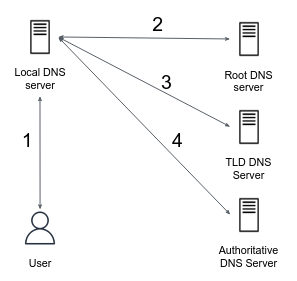Please answer the quiz and click the "Test" button at the bottom right.This quiz is part of the DevOpsTheHardWay course.
Networking - DNS - multichoice questions
Question 1
Which file is used when resolving the hostname localhost?
- /etc/inittab
- /etc/hosts
- /etc/resolv.conf
- /etc/sysconfig/localhost
- None of the above
Question 2
Assume the following DNS records are stored in a TLD DNS server:
(www.google.com, ns1.google.com, ???, 3600)
(ns1.google.com, ???, A, 60)
Assume the following records are stored in the google.com authoritative DNS server:
(www.google.com, us-east-1.google.com, ???, 3600)
(us-east-1.google.com, 146.54.29.12, ???, 60)
Choose the possible input for the missing content (top-down)
- NS, 192.168.229.2, CNAME, A
- NS, 193.168.229.2, CNAME, A
- NS, 146.44.119.13, CNAME, AAAA
- A, 127.0.0.1, CNAME, A
Question 3
Given a user who is trying to resolve gov.org.il. Assuming the local DNS server doesn't have the IP or the hostname of the DNS server responsible for the .il TLD.
Where does the local DNS server go?
- DNS Local
- DNS Root
- DNS TLD
- DNS Authoritative
Question 4
Given the following description of each DNS server in the hierarchy, match the DNS server type according to the following order:
- Highest level of the DNS hierarchy, knows how to reach servers responsible for a given domain (e.g., .com, .edu).
- Replies to DNS query requested by a local user. Requesting all other DNS servers to answer the query on behalf of the user.
- Responsible for a domain (e.g., .com, .edu); knows how to contact authoritative name servers.
- Provides hostname to IP mappings for organization's domain.
- Root-level, local DNS, TLD DNS, authoritative DNS
- TLD DNS, Root-level, local DNS, authoritative DNS
- Root-level, local DNS, authoritative DNS, TLD DNS
- local DNS, Root-level TLD DNS, authoritative DNS
Question 5
What are the benefit(s) of caching in the local DNS server?
- Less load on root-level, TLD and authoritative servers
- Provides prioritized access to the root servers
- Faster replies (if there is a cache hit)
- Helps organizations to shut down their authoritative servers as the data is cached locally
Given a client, local DNS server, root level, TLD and authoritative servers, as described here:

Suppose that the local DNS server caches all information coming in from all root, TLD, and authoritative DNS servers for 20 seconds. Assume also that the local DNS server cache is initially empty. The client has no any caching mechanism. Assume that a DNS query latency is 2 seconds (1 second for each side - request and response) for all servers (client - local DNS, local DNS - root level, local DNS - TLD, local DNS - authoritative server).
Consider the following DNS requests, made by some clients at the following order:
google.comicann.orgamazon.comgoogle.comcnn.comgoogle.com
Answer the following 3 questions. When you're asked to calculate the resolve time of a given domain, count only the time it takes to resolve the domain itself, exclude the time taken to resolve the previous domains in the list
Question 6
Which of the domains require 8 seconds to be resolved?
- 1
- 2
- 3
- 4
- 5
- 6
Question 7
Which of the domains require 6 seconds to be resolved?
- 1
- 2
- 3
- 4
- 5
- 6
Question 8
Which of the domains require 2 seconds to be resolved?
- 1
- 2
- 3
- 4
- 5
- 6
Question 9
Choose the correct sentences regarding local DNS server:
- Records for a remote host are sometimes different from that of the authoritative server for that host.
- Can decrease the resolution time
- Holds only A records, but not NS records.
- Is only contacted by a client if that client is unable to resolve a name via recursive queries into the DNS hierarchy.
Question 10
What is the role of an authoritative name server in the DNS?
- Is the source of truth in respect to the correct IP address of a hostname.
- Provides a list of TLD servers that can be queried to find the IP address of the hostname.
- It is a local server that caches data.
- It provides the IP address of the DNS server that can provide the hostname A record.
